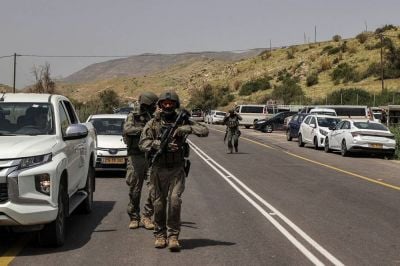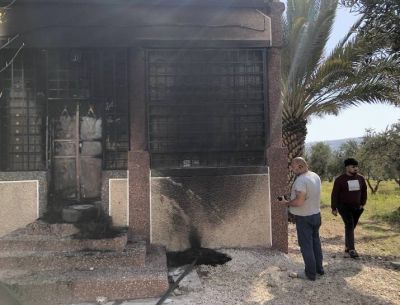
A man walks past an election sign depicting Prime Minister Benjamin Netanyahu and far-right politicians, including Itamar Ben-Gvir and Bezalel Smotrich, in Jerusalem in 2019. (Credit: AFP)
Sometimes, reality can be stranger than fiction.
One example is when US President Joe Biden openly criticized Israel over its proposed judicial reform initiative that threatens the independence of the judiciary.
Another is when some individuals within Israeli Prime Minister Benjamin Netanyahu’s inner circle went as far as to suggest that the recent wave of protests in Israel is being funded by American organizations.
This kind of rhetoric is reminiscent of the language used by authoritarian regimes in Iran and Syria, which often blame Mossad for the popular uprisings in their countries.
Since March 27, the most right-wing government in Israel’s history has postponed an initiative that has sparked intense debate and criticism.
The initiative’s detractors argue that it poses a risk to the separation of powers and the independence of the judiciary by increasing the control of elected officials over the judiciary.
However, the executive branch and its ultra-Orthodox and far-right allies maintain that the initiative is necessary to counteract what they see as excessive politicization of the Supreme Court.
The issue has attracted the attention of Western governments and news outlets, which express concern over the implications for Israeli democracy. French President Emmanuel Macron, for instance, has cautioned Netanyahu against any reform that could erode democratic standards.
The postponement raises the question of whether this initiative will be revived in the future and what its potential impact could be on Israel’s democratic institutions.
Many articles and op-eds have expressed a sense of disbelief, anguish or sadness at the ascension of a radical coalition, as if this represents a sudden departure from what has been seen, up until now, as “just” order
“The Israel we knew is gone,” Thomas Friedman said in a New York Times article on Nov. 4, following legislative elections in the country.
“Israel’s democracy is at a breaking point,” read the headline of a Washington Post piece on March 26.
“I have been ashamed and fearful of what is happening in Israel for almost three months,” journalist Anne Sinclair wrote in Le Monde just three days later.
This concern over the state of Israeli democracy reflects the gradual collapse of a longstanding myth — that of liberal Zionism.
For a long time, Israel managed to expropriate Palestinian land through the clash of arms and the silence of the law without arousing anything other than formal reprobation from its supporters abroad.
The arguments in defense of Israel have always been various.
Israel is said to be the only democracy in the Middle East, with a free press and strong checks and balances. Unlike other countries in the region, Israel protects sexual and gender minorities. It has always sought to live in peace with its neighbors, who have always refused to compromise.
What’s more, one of the most persistent distortions of history claims that the Palestinians rejected the United Nations partition plan in 1947. While this criticism may be true, it overlooks another reality: the plan allocated over 55 percent of the territory to a Jewish state that represented only about 30 percent of the population and was given the most fertile lands.
From the Arab point of view, it was difficult to accept this partition.
From the outbreak of the Jewish-Palestinian civil war in 1947 to the present day, a web of myths has been woven around Israel’s history and identity.
The current fear of a breakdown in the rule of law [in Israel] prompts the question: which law are we referring to exactly?
It is the law that, in 1950, allowed Israel to seize the property of the “absentees,” i.e., the Palestinians who were driven from their homes during the Nakba (the expulsion of Palestinians from their homes following the establishment of the Israeli state in 1948). It was also in the name of the law that hundreds of Palestinian families were expelled from East Jerusalem after Israeli troops conquered that part of the holy city in 1967.
In the occupied territories, Israel has complete and arbitrary control over Palestinian life. Nearly 40 percent of the male population has been incarcerated at some point since 1967. Confessions in military courts are considered proof, but they are often obtained without a real trial and through considerable pressure on the main parties concerned.
In the Gaza Strip, which is regularly subjected to Israeli fire, the blockade restricts the mobility of inhabitants and their access to basic necessities.
According to a report by the Israeli human rights NGOs B’Tselem and Kerem Navot, the number of settlers in the occupied West Bank increased by 42 percent between 2010 and 2021 and has more than quadrupled since 2000.
From 1967 to the present, 662,000 settlers have moved into the occupied West Bank and illegally annexed East Jerusalem, where 3.5 million Palestinians live.
The freedom of some is protected by the law and weapons of the Israeli state, while the freedom of others is harshly repressed by a system of permanent control.
Within Israel itself — where a military rule was imposed on Palestinians who became Israeli citizens between 1949 and 1966 — the “nation-state” law passed in the Knesset in 2018 recognizes the right to self-determination only for Jews.
In Lebanon, Jordan, Syria and the Palestinian-occupied territories, more than 5 million Palestinian refugees are registered. They have been denied their right to return for over 70 years, with no compensation offered to them.
Emptying the space
Several international human rights organizations have labeled the state of Israel an apartheid regime, with some restricting their definition to the occupied territories and others extending it to include the situation within Israel’s borders.
The concept of apartheid, along with the associated settler colonialism, is fundamental in comprehending the legal, political and social reality of the Palestinians.
However, these concepts are not all-encompassing. The original intention was not to “civilize” a group considered inferior or to exploit their labor force.
Today, it is true that the Israelis control all aspects of Palestinian life, including their economy, but it is not the scenario they would have preferred.
The aim of Zionism was never to subjugate a people, but to drive them out. To empty the space and make room for the construction of the Jewish national project.
None of this is brought to the fore in the current criticism of the Netanyahu government.
These criticisms often come from those who reject the legal characterization of apartheid not because they find it inadequate, but because they deem it slanderous.
Those who fear the erosion of Israeli democracy forget that if ever the state of Israel was truly democratic, its democracy has always been limited to the Jewish people.
Furthermore, all strands of Zionism — left-wing, right-wing, secular or religious — carry the potential to perpetuate Palestinian subjugation.
Even those considered “progressive” have actively participated in the ethnic cleansing of Palestine.
As a result, the pursuit of self-determination by those claiming roots in aJewish nation was only made possible through the systematic dispossession and widespread imprisonment of Palestinians, as well as the fragmentation of their national identity.
There was a time when the future of the occupied territories and the search for peace with the Palestinians were divisive issues among Israelis.
However, this is no longer the case today.
Although there are still individuals in Israeli society who, despite the decline of liberal Zionism, recognize the injustice inflicted on the West Bank and Gaza, many view it as an anomaly rather than as a continuation of the Nakba in other forms.
As a result, the original fault is often traced back to 1967. Prior to that, Israel was perceived to be on the right side of history. This is why there is a taboo surrounding the conditions of Israel’s birth and the expulsion of nearly 800,000 Palestinians from their land.
Historically, this supposedly moral stance was not only driven by ethical considerations but also by pragmatic ones and demographic fears, which stemmed from the need to preserve Israel as a Jewish and democratic state.
For secular Israelis who opposed the occupation, the ongoing settlement would eventually eliminate the possibility of a Palestinian state on the ground.
From the Mediterranean Sea to the Jordan River, there would only be one de facto territory, but with such division in rights that it would pose a Cornelian choice for Israel: to be either Jewish or democratic?
Bleak outlook
Undoubtedly, the facade of Israeli democracy is no longer deceptive.
This could, in theory, aid the struggle against the occupation and colonization of Palestine. According to this argument, Western liberal regimes can no longer use Israel’s window of openness and modernity to justify their economic, technological, political, and security alliance with it. Or, at least, they can no longer do so under the pretense of shared values.
However, it would be an illusion to believe that their relations with Israel are truly being called into question. This is because Western democracies themselves are experiencing a crisis. The identity-focused and populist right-wing movements are growing in strength and are unabashedly supportive of Israel, even when they harbor anti-Semitic beliefs.
On the liberal side, whether leaning left or right, the fight against Islamist terrorism over the past two decades has resulted in increasing empathy toward Israel and a gradual alignment with its security discourse.
Furthermore, the Arab states have largely abandoned the Palestinian cause. For some commentators, the collapse of Israel’s democratic facade is also viewed as further evidence of its anchorage in the region.
Ultimately, in matters of realpolitik, the nature of regimes is not considered a priority criterion.
The ongoing developments in Israel are concerning.
While for most Palestinians, disputes within Israeli society have always centered on the administration of the colonial regime — rather than its demise — the fact remains that a society with significant segments advocating for equality for all within the 1967 borders and an end to the occupation of the Palestinian territories is more inclined to question itself, not to dehumanize its enemy and to, possibly, one day face its history. In Israel, this was for instance the case after the invasion of Lebanon in 1982 or in the aftermath of the first intifada in 1987. Today, these voices hardly exist anymore.
On the contrary, the current outlook is bleak.
The possibility of a viable Palestinian state has never seemed more remote.
The continued colonization of the West Bank and East Jerusalem has caused many to question whether the two-state paradigm, despite its flaws, is still the best realistic option in the short and medium term.
However, it remains unclear what alternative could replace it.
Many Palestinians are now considering the idea of abandoning their aspiration for a state within the 1967 borders and instead calling for a single state that would be home to both Jews and Arabs.
This would require a “de-Zionization” of the territories that used to form Mandate Palestine.
However, given that Israel was not prepared to relinquish its Jewish character when it was governed by the secular left, it is difficult to imagine that it would be willing to do so under the governance of self-assured Jewish supremacists.
If a Labor politician like Ehud Barak played a leading role in derailing the Oslo Accords, what hope is there with extremist figures like Bezalel Smotrich or Itamar Ben-Gvir in power?
The current balance of power is in Israel’s favor. And it favors, in Israel, the worst possible actors.
This article was also published in French by L'Orient-Le Jour. Translation by Sahar Ghoussoub.

